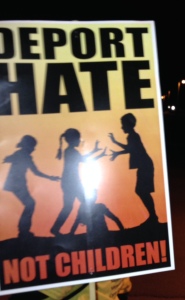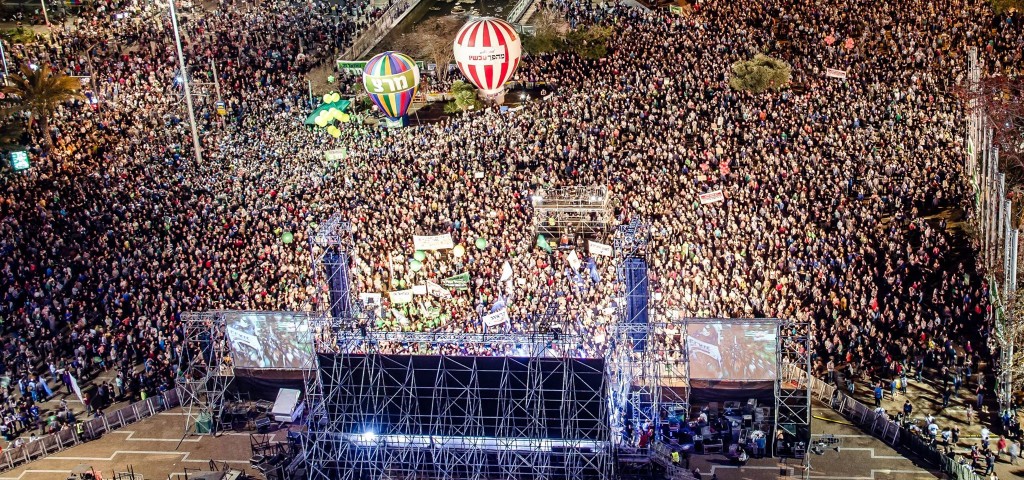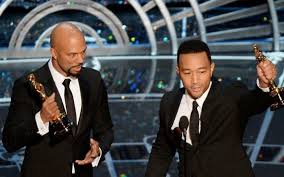I can’t quite find a prooftext in this week’s parasha, Va-Yakhel, to make the point that I want to make, but I guess this will have to do: “Thus the Israelites, all the men and women whose hearts moved them to bring anything for the work of the LORD [the building of the mishkan], through Moses, had commanded to be done, brought it as a freewill offering to the LORD. (Exodus 35:29) I suppose this is as close to an election that the Israelites had under Moses, a voluntary but crucial participation in building their communal institutions, unusually (and perhaps uniquely) both by men and women.
Category Archives: Articles
In A Detention Center in Dilley Texas On International Women’s Week– by Ahavya Deutsch*

Photo by Lawyer Teo Siguenza
Just wanted to write to let you know how things are here in South Texas Family Residential Center, Dilley Texas. In a word: depressing. There are about 300 mothers here, all with young children. The mothers range from late teens to early twenties, and are from Guatemala, El Salvador and Honduras. Some of them speak indigenous languages, and only marginal Spanish, and all of them have suffered terribly. Many of them are fleeing terrible domestic violence, and report that the police in their home countries will not protect them, and even collude with their batterers. Many of them report that gangs threatened them or their children, including forcing them to pay large sums of money to prevent their children being kidnapped and sold into sexual slavery, and being threatened with their children’s murder if they fail to pay enough money.
Israel Wants Change—by Ayala Emmett and David Langerman*

Saturday March 7 2015
Rabin Square Tel Aviv
Under the banner “Israel Wants Change,” tens of thousands (estimates run from 40,00-80,000) Israelis came out last Saturday to Rabin Square in Tel Aviv to register their opposition to Netanyahu’s policies. Coming into the square was a group of some forty retired soldiers and commanders of all ranks of the Armored Brigade that was the first to cross the Suez Canal in 1973. These veterans’ message was to engage in a peace agreement with Palestinians. As the veterans approached from behind the large crowd they wondered how they would make their way to the stage. According to Michal Herzog who was there, she said, as a citizen for change, the veterans presence electrified the rally and turned it into the most moving moment: as people saw them carrying their 1973 Veterans’ posters, the crowd parted to make way for the veterans, cheering and applauding as they walked to the stage.
I Am Charlie. I Am Not Charlie—by Michael Aronson
I recently decided to go back in internet time and read some articles criticizing Je Suis Charlie. I did not do this to raise a dead issue, but because the argument always seemed incomprehensible to me, yet somehow important.
Two themes jumped out at me: that Charle Hebdo is a vile publication, and free speech. The arguments run that Charlie Hebdo’s offensive rhetoric neither sanctions the slaughter of its editors, nor justifies the worship-like attention to Charlie Hebdo or Je Suis Charlie as slogans of free speech. Citing free speech as a reason to offend people is not heroic, and championing this activity in the name of free speech skews what the right to free speech actually means.
Why Pray?–by Michael Aronson
One of the principle divides between so-called orthodox and non-orthodox Jewry is whether or not one prays regularly. In Judaism, prayer means something very specific. We recognize spontaneous prayers – Talmud and Midrash are full of prayers by the masters, and many of these have been incorporated into the Siddur – but when rabbinic literature refers to prayer, tefillah, it refers to the Shemonei Esrei, otherwise known as the Amidah.
Why is the Shemonei Esrei important? I can rattle off historical facts. Shemonei Esrei is one of the oldest Jewish texts. Shemonei Esrei is the central prayer of the individual and community Jewish service. Shemonei Esrei is the prayer of all religious Jews of all lands, responsible for protecting a core Jewish identity in diverse times and places. All of these things deserve deeper comment. But I believe these kinds of didactic statements obscure one of the most fundamental aspects of the Shemonei Esrei: Shemonei Esrei articulates the central Jewish value system that informs daily life.
Benjamin Netanyahu and Abraham Lincoln—by Peter Eisenstadt
Today Benjamin Netanyahu, as you probably have heard, will address a joint session of Congress. Whatever he says, the speech will probably be in the running for one of the worst speeches ever given in Washington. There is a lot of competition. But tomorrow, March 4th is the 150th anniversary of what was probably the greatest speech ever given in the city, President Abraham Lincoln’s Second Inaugural Address. It is a speech that all heads of government, perhaps especially Israeli prime ministers, ought to study carefully.
Netanyahu Stepped into a Perilous Republican Narrative –by Ayala Emmett
Since 2008, Republicans have taken every opportunity to portray President Obama as an alien Other who came from Africa without a birth certificate. In accepting Speaker Boehner’s invitation to speak before members of Congress, Prime Minister Netanyahu stepped into a Republican narrative dotted with racial innuendos intended to undermine and delegitimize President Obama. In the larger American context Netanyahu’s visit has become much more than a serious and legitimate disagreement with the president about Iran. In accepting Speaker Boehner’s invitation, Prime Minister Netanyahu has effectively joined the Republicans’ narrative and became part of their effort to undermine the president of the United States. By aligning himself with Republicans to undercut the president Netanyahu linked himself to Right wing media and politicians who are attacking Obama’s political decisions, domestic and foreign as un-American and disloyal. A political narrative that constructs the president of the United States as “un-American” is not where foreign leaders should situate themselves and few have done it until Netanyahu. Now Israel’s prime minister has linked himself with the Republican efforts to un-Americanize the president in a fashion that was displayed last week by Rudy Giuliani.
Rally Day in Paris –by Michael Aronson
They told us not to go to the rally, so we did not go. The rally was to highlight the unity and diversity of France, they said, not tourists. We are sure other tourists went anyway. We still stayed away, but this did not stop us from experiencing the rally from the streets of Paris, walking along Rue de Sebastopol and de Rivoli, the side streets of the Marais and the Siene:
Paris is on the streets today, up in arms over the recent slaughters at the Charlie Hebdo newspaper and the kosher supermarket. “Je Suis Charlie” is everywhere. On posters and buses and billboards, solidarity displays sanctioned by the government, but also spray painted on walls and sidewalks and streets. No attempts are being made, so far as we can see, to repair or hide these spontaneous acts of vandalism. Paris is Charlie. Outrage is on the streets today.
Oscars’ Night and America’s “Selma”—by Ayala Emmett and Peter Eisenstadt

Last Sunday some of us stayed up late not because we were Oscars’ devotees but because we hoped to see “Selma” win. Many of us, viewers and reviewers, who saw the film following its release in November 2014, thought of several Oscar wins because of the high quality of the film. We were captivated by its astonishing cinematic qualities, the fine work of cinematographer Bradford Young; we were spellbound by a riveting storytelling that director Ava DuVernay skillfully created while drawing on a well-known narrative. Reviewers praised this accomplishment noting that, “even if you think you know what’s coming, ‘Selma’ hums with suspense and surprise. Packed with incident and overflowing with fascinating characters, it is a triumph of efficient, emphatic cinematic storytelling.”
Gift Giving and Community Building—by Ayala Emmett
Coming out of Egypt for the Israelites was a social/religious transformational journey to become a unified, covenantal, ethical community. Beyond the physical/geographic details of the move, the book of Exodus pays close attention to the Israelites’ social journey away from an unformed crowd of former slaves toward becoming a people. No one act sealed the deal of peoplehood, not the dramatic exodus from Egypt, nor the miraculous parting of the sea, not even receiving the Ten Commandments; yet each act constituted and provided a rich layer in the process of becoming one people. This was a tough road for the Israelites, a massive social change that required constant and steadfast commitment that was guarded by God and guided by Moses.